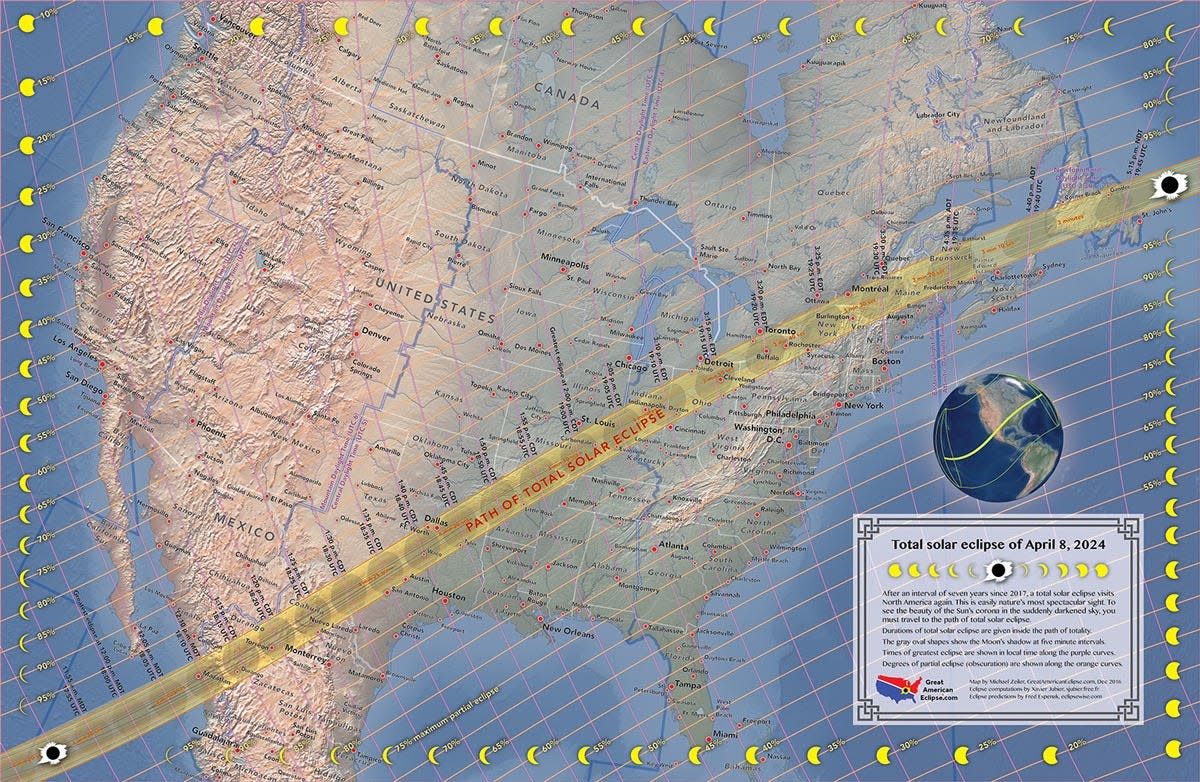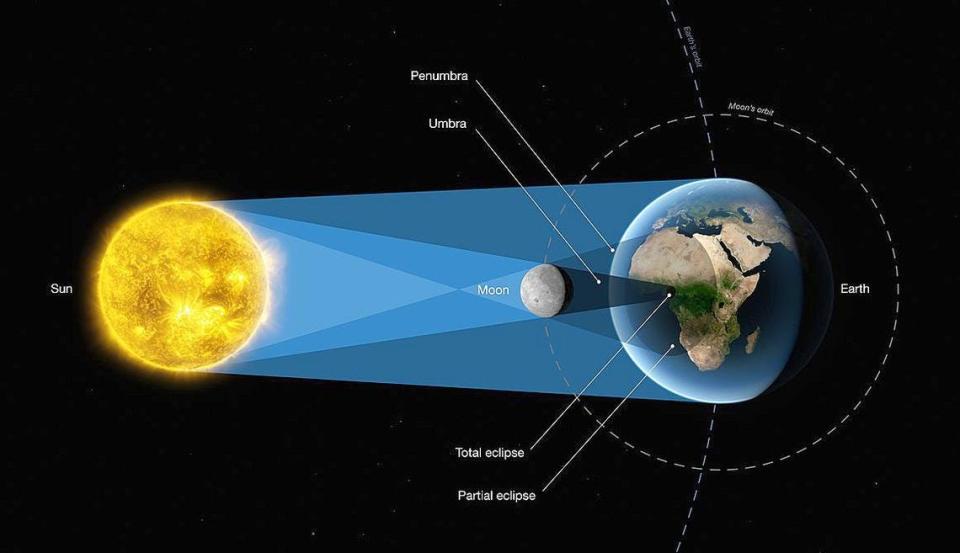Hoosiers have less than 4 minutes to see this rare total solar eclipse in 2024

Hoosiers living in some parts of Indiana will be treated to a rare total solar eclipse that will cut a narrow ribbon across North America in 2024.
How rare?
Astronomers say the next total eclipse seen from the contiguous United States won't happen again until August 2044. And the last time a total solar eclipse passed over Indianapolis was more than 800 years ago in 1205 when Genghis Khan was consolidating his power in China.
"That 1205 total eclipse path only covered the southwest side of the city," said Butler University Physics & Astronomy professor Brian Murphy in a message to IndyStar. "For the northeast side of the city, the last total eclipse was in 831."
Murphy, who also serves as director for the Holcomb Observatory & Planetarium, said it's not that total solar eclipses are rare — they occur every year or two somewhere on the Earth's surface — it's that width of the totality is relatively small at around 100 miles, and so they pass a given location only once every 400 years or so.
"Given our last eclipse was more than 800 years ago, we are long overdue," Murphy said.
Here's everything you need to know about the total solar eclipse moving across Indiana in 2024.
What happens during a total solar eclipse?
A total solar eclipse occurs when the Moon passes between the Sun and Earth, completely blocking the face of the Sun. The sky will darken as if it were dawn or dusk.
"In my opinion as both an astronomer and a human being is that a total solar eclipse is by far one of the most amazing things you can see in your lifetime," Murphy said. "I’ve seen three total solar eclipses in my lifetime and in each occasion I was awed."

How to safely watch a solar eclipse.
Safety should be your top priority when viewing an eclipse.
It's never safe to look directly at the sun without specialized eye protection made for solar viewing. To protect your vision, be sure you're using safe solar viewers, which are thousands of times darker than regular sunglasses and comply with international safety standards.
Scientists at NASA advise people watching an eclipse take the following precautions:
Always use solar viewers, or "eclipse glasses" to watch a solar eclipse outside the "moment of totality," when the moon completely obscures the Sun.
Inspect your eclipse glasses or handheld viewer for scratches. If damaged, discard them.
Always supervise children using solar viewers.
DO NOT look at the Sun through a camera lens, telescope, binoculars, or any other device while wearing eclipse glasses. The concentrated solar rays will burn through the filter and can cause serious eye injury.
You can view the eclipse directly without proper eye protection only when the Moon completely obscures the Sun's rays. As soon as you see even a little bit of the sun, immediately put your eclipse glasses back on.
When is the total solar eclipse in 2024?
Monday, April 8, 2024, is when a total solar eclipse will cross North America, cutting a 115-mile wide path through parts of Mexico, the United States, and Canada.
Where and when to see the total solar eclipse of 2024 in Indiana.
According to NASA and Eclipse2024.org, Hoosiers will be able to watch the total solar eclipse of 2024 at the following times and places.
City | Partial Eclipse Begins | Total Eclipse Begins | Duration of Total Eclipse | Partial Ends |
Evansville | 12:45 p.m. CT | 2:02 p.m. CT | 3 mins 2 secs. | 3:20 p.m. CT |
Terre Haute | 1:48 p.m. ET | 3:04 p.m. ET | 2 mins 57 secs | 4:21 p.m. ET |
Bloomington | 1:49 p.m. ET | 3:04 p.m., ET | 4 mins 2 secs | 4:22 p.m. ET |
Indianapolis | 1:50 p.m. ET | 3:06 p.m. ET | 3 mins 46 secs | 4:23 p.m. ET |
Muncie | 1:52 p.m. ET | 3:07 p.m. ET | 3 mins 46 secs | 4:24 p.m. ET |
For more details on where to watch the total solar eclipse, click the following link to a Google eclipse map created by Xavier Jubier, which supports zooming down to the street level.
Holcomb Observatory and Planetarium will also provide educational programming about the eclipse. Visit butler.edu/arts-sciences/holcomb-observatory/ for more information.
John Tufts covers evening breaking and trending news for the Indianapolis Star. Send him a news tip at [email protected].
This article originally appeared on Indianapolis Star: Indiana to have total solar eclipse in 2024; where and when to see it
